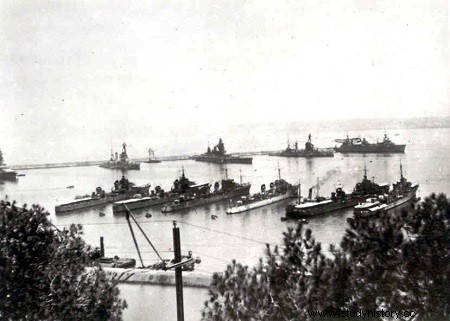
During the days that followed Dunkirk, the Germans, without wasting a minute, rushed straight into the heart of France. By mid-June, the French armies were incapable of any organized resistance, and Mr. Paul Reynaud, Prime Minister, had to seek the consent of the British government to ask the Germans for their armistice terms. Churchill's response, received on the afternoon of June 16, was formal:"On condition, but only on condition that the French fleet be immediately directed to British ports pending the opening of negotiations, the government of Sa Majesty gives its assent to a step by the French government with a view to knowing the conditions of an armistice for France. »
Compelling strategic considerations had dictated this answer. If Great Britain and the Commonwealth wanted to continue the struggle alone, they had to retain control of the sea at all costs. It seemed likely that Germany would want to seize the French fleet and its powerful and modern ships. Not only would the Channel and Atlantic ports be excellent bases from which effective actions could be taken against British maritime communications, but, furthermore, the eviction of the French navy from the western Mediterranean and the italy's entry into the war on June 10 seriously threatened shipping to the Middle East. Furthermore, if the Italian army in Libya managed to seize Alexandria, all that would remain for Admiral Sir Andrew Cunningham's naval forces, deprived of secure bases, was to evacuate the eastern Mediterranean.
Another danger to Great Britain's maritime communications would arise from the possible seizure of the French bases of Casablanca and Dakar, placed on the flank of the long supply route, via Cape Town, of the British armies of the Middle and Eastern regions. Far East and India, a route that has become vital since the Mediterranean was no longer safe. The ministerial crisis had already reached its climax when Mr. Reynaud received the British response, but he hid it from his colleagues, for fear of giving a weighty argument to those who supported Marshal Pétain in his insistence on immediate negotiation with the Germans. The offer, that same evening, of a Franco-British Union, having failed to rally its ministers behind Mr. Reynaud, the latter resigned.
